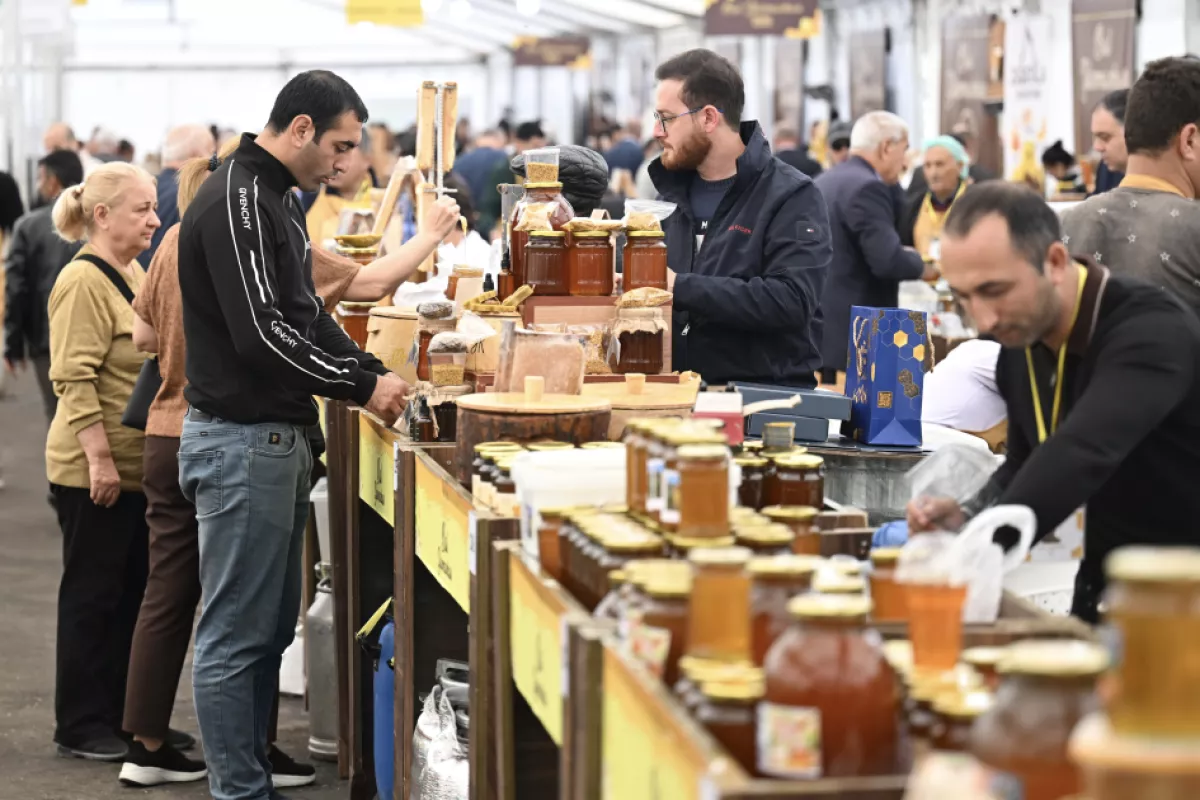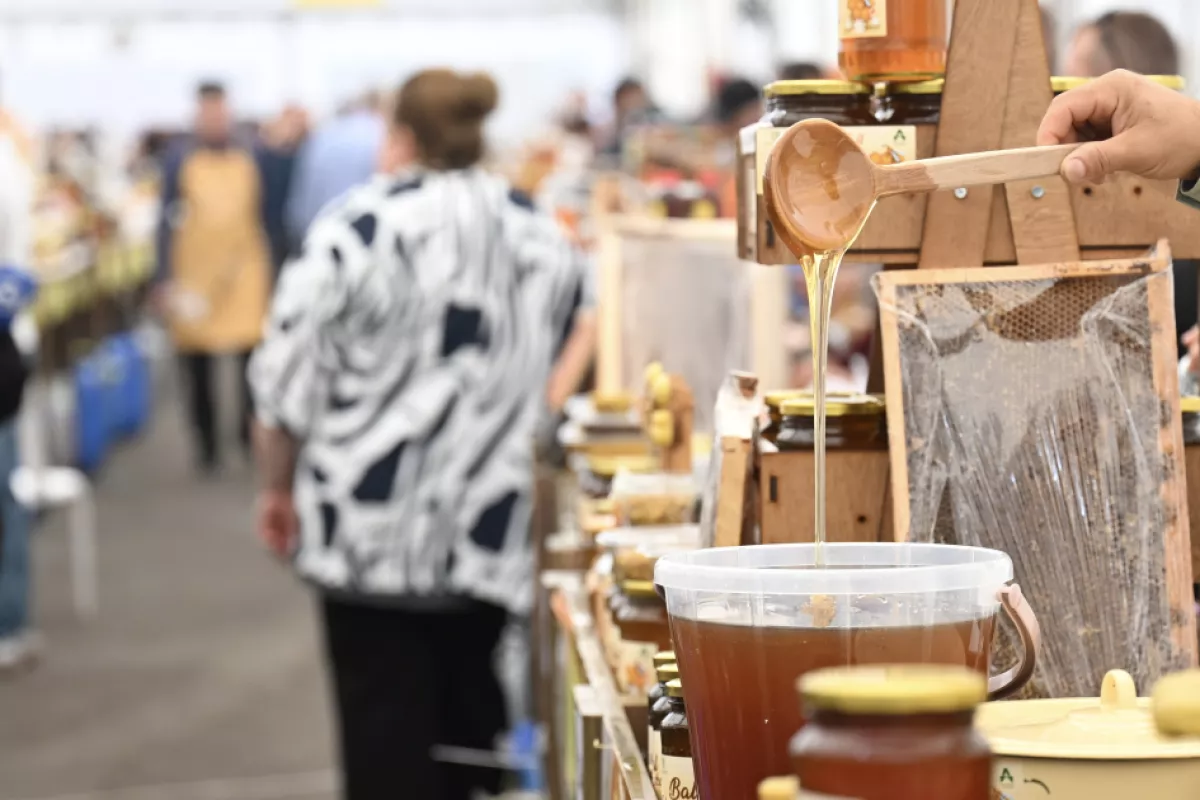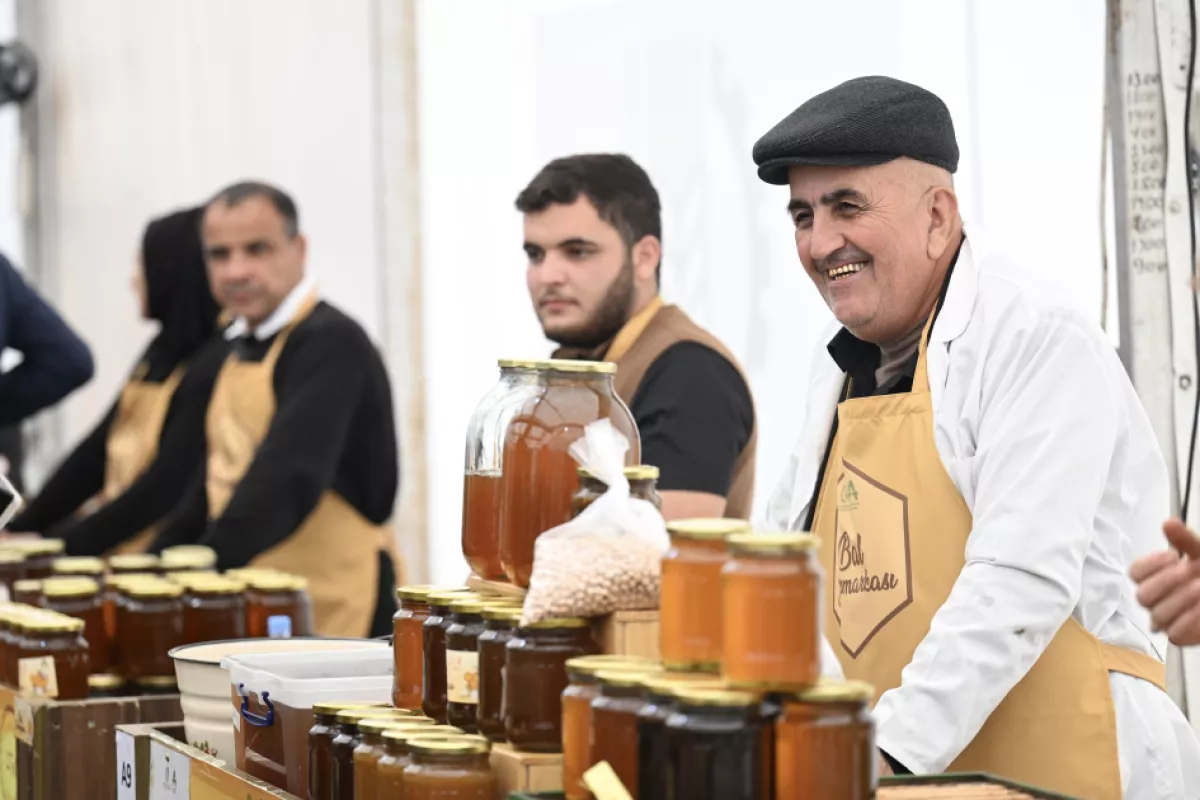Beekeeping in Azerbaijan: spotlight on Karabakh’s apiaries Caliber.Az review
In recent years, Azerbaijan’s beekeeping sector has experienced steady and dynamic growth, driven in large part by the relocation of tens of thousands of bee colonies to the mountainous regions of the country’s territories recently liberated from occupation. Today, local beekeepers face the dual challenge of boosting productivity and expanding the export markets for their environmentally friendly honey, including varieties produced in Kalbajar and other mountainous districts of Karabakh and East Zangezur. The achievements and future prospects of the industry were highlighted at the 25th Republican Exhibition-Fair of Beekeeping Products, which opened in Baku last weekend.
For the fifth consecutive year, farmers from the East Zangezur and Karabakh economic zones have showcased their products at the traditional beekeeping fair in Baku’s Narimanov district, near the Ganjlik metro station. This year’s 25th anniversary fair—organised by the Ministry of Agriculture and its affiliated JSC Agro Procurement and Supply in partnership with the Azerbaijan Beekeepers Association—features around 280 beekeepers from 43 districts across the country. Participants have brought over 100 tonnes of honey, along with more than fifteen other industry products, including royal jelly, beeswax, propolis, and pollen.
Exhibition spaces are allocated based on the number of beekeepers from each district, and all products on display have been carefully selected and laboratory-tested by the Azerbaijan Food Safety Agency. For the first time this year, with support from specialists at Agro Procurement and Supply, farmers are also receiving free assistance with packaging and branding to help promote and market their products.

The exhibition-fair, running until November 9, showcases a wide variety of products from the apiaries of Kalbajar, Lachin, and several other districts of Karabakh, where beekeeping farms have been relocated since spring 2021. For the first time this year, products under the trademark “Khojaly Honey” are being presented. This organic honey is harvested from meadows and trees in the foothills of Qirkhqiz in Khojaly.
The relocation of beekeeping farms to mountain meadows and forested areas—demined and safe zones—in Azerbaijan’s territories liberated from occupation is carried out according to a unified regulation. Farmers registered in the Electronic Agricultural Information System (EKTIS) and owning at least 40 bee colonies are eligible for relocation. The results of this initiative, launched five years ago, have exceeded expectations. In Kalbajar alone, the average honey yield per hive surpasses 50 kg, more than twice the national average. Productivity in other liberated districts has also exceeded national levels.
The continued development of this programme promises a significant boost in honey production, thanks to improvements in the beekeeping forage base. The Lesser Caucasus region—with its mountainous meadows, highly nectar-rich plants, absence of industrial activity, and minimal use of agrochemicals—offers ideal conditions for apiaries. Honey produced here is not only environmentally pure but also boasts unique taste and medicinal properties, as repeatedly recognised by experts at international exhibitions.
Notably, at the end of September this year, a honey festival was held in Kalbajar for the first time, organised on the initiative of Leyla Aliyeva, Vice-President of the Heydar Aliyev Foundation and founder and head of the public association IDEA. The festival brought together 37 beekeeper-farmers from the Karabakh and East Zangezur economic regions, other parts of the country, as well as young beekeepers supported by IDEA. This regional forum has significant potential to reach the international level in the near future.
“We aim to make the festival a traditional event, inviting beekeepers from all regions of the country and promoting Kalbajar honey as a brand. In the future, we plan to take this festival to the international stage,” recently stated Minister of Agriculture Majnun Mammadov. “In the near term, particular attention will be given to the development of beekeeping in Karabakh and East Zangezur.”

The main goal of the festival is to promote and geographically expand the reach of Kalbajar honey, as well as to support the growth of export opportunities for Karabakh’s beekeeping farms. In this context, recent negotiations have focused on supplying honey under the collective “Karabakh” brand to markets in neighbouring countries, as well as in Asia and the Middle East, with potential future expansion to the European Union.
The primary efforts to establish honey and other beekeeping product exports have been led by the Azerbaijan Export and Investment Promotion Foundation (AZPROMO) and Trade Houses, which have helped honey producers participate in specialised exhibitions and trade missions, promoting domestic products in post-Soviet markets as well as in more distant countries. In less than a decade, exports have been established primarily to the UAE and Japan, with trial shipments sent to Jordan, Bahrain, Qatar, and, more recently, Iraq, Libya, and Egypt. Promotion of domestic beekeeping products is also actively conducted through Azerbaijan’s Trade Houses in the Baltic states, Poland, China, and Russia under the collective “Made in Azerbaijan” brand.
Meanwhile, in recent years, international cooperation has intensified through the Ministry of Agriculture and the Beekeepers Association within the framework of several programs implemented jointly with the United Nations Food and Agriculture Organization (FAO). These programs focus on improving the genetic stock of local bees, addressing packaging challenges, obtaining international certification, and enhancing the export potential of Azerbaijani honey.
Technical and advisory support for Azerbaijani beekeepers in the field of breeding and queen rearing is also provided by the Turkish Cooperation and Coordination Agency (TIKA). This assistance has contributed to the establishment of experimental queen-rearing farms in Azerbaijan, the development of beekeeping in the liberated village of Jojug Marjanli in the Jabrayil district, and the expansion of apiaries across the Karabakh region.

According to the Minister of Agriculture, state support and cooperation with international organisations have helped increase the number of bee colonies in the country nearly 2.5 times in recent years. It should be recalled that, under a decree signed by the Head of State in 2018, beekeepers receive subsidies for each bee colony over a period of five years. As a result, over the past seven years, the number of bee colonies in Azerbaijan has risen from 270,000 to almost 600,000. This has directly stimulated growth in honey production.
Final statistics on honey production in Azerbaijan for 2025 have not yet been released; however, thanks to relatively favourable weather conditions this year, it is likely that the good growth rates achieved last year will be maintained. According to data from the State Statistics Committee of Azerbaijan, in 2024, more than 30,600 farming households produced over 5,166 tonnes of honey, reflecting a 13.5% increase.








